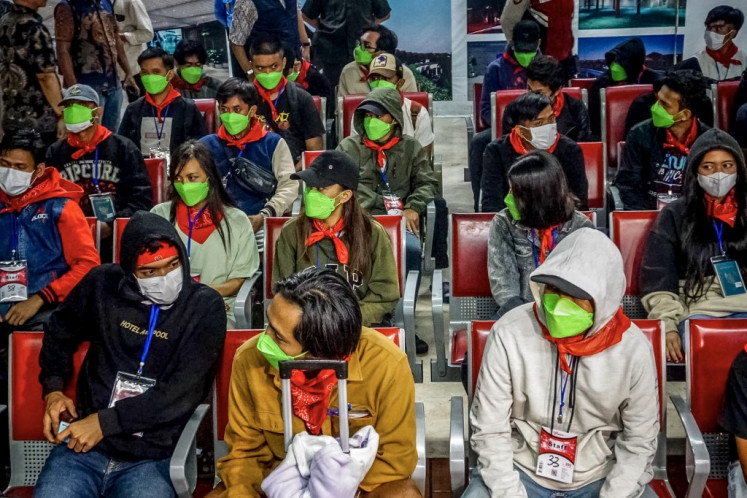Popular Reads
Top Results
Can't find what you're looking for?
View all search resultsPopular Reads
Top Results
Can't find what you're looking for?
View all search resultsRI asked to promote connectivity with neighbors
Despite its ongoing efforts to improve domestic connectivity, Indonesia, Southeast Asia’s largest economy, needs at the same time to enhance regional connectivity to keep pace with dynamics in the Asia Pacific region, the World Bank advises
Change text size
Gift Premium Articles
to Anyone
D
espite its ongoing efforts to improve domestic connectivity, Indonesia, Southeast Asia’s largest economy, needs at the same time to enhance regional connectivity to keep pace with dynamics in the Asia Pacific region, the World Bank advises.
Sjamsu Rahardja, a senior economist at the World Bank, said in Jakarta on Friday that better connectivity with the region would allow Indonesia to gain economic benefits from the integration, such as the creation of new growth centers in the archipelago.
“We cannot expect expansion to come solely from Java. If Kalimantan is better connected with Malaysia, this will benefit Indonesia in terms of enjoying distribution of [economic] growth. So greater connectivity should be promoted,” he told reporters in the sidelines of a focus group discussion on connectivity among members of the Asia-Pacific Economic Cooperation (APEC).
As establishing regional connectivity might take a sizeable amount of funds, particularly for physical infrastructure development, Indonesia could start the discussion over the regulatory framework with its neighbors to accelerate the process, Sjamsu further said.
Intensive and regular dialogues between regulators among APEC members, where Indonesia was expected to actively engage, would also be necessary to address regional connectivity within the Asia-Pacific, he added.
Regional connectivity is the key agenda of the APEC summit scheduled in Nusa Dua, Bali, on Oct.7-8 this year, which aims to roll out the bloc’s connectivity framework to further ease economic activities in the region and embrace deeper regional integration.
In its recently-published report, the World Bank estimates, among other things, that the manufacturing industry in the United States will rise again on the back of an efficient market and adequate infrastructure, resulting in stronger economic growth in the upcoming years. This will in turn make APEC one of the most dynamic economic regions in the world.
Since 2011, Indonesia, currently the world’s 16th biggest economy, has pushed ahead with its plan to generate billions of dollars in investment to push up its gross domestic product (GDP) to about US$4.5 trillion by 2025, a move that will prompt it to join in the rank of the world’s top 10 economies.
Through the so-called Master Plan for the Acceleration and Expansion of Indonesian Economic Growth (MP3EI), one of the world’s biggest archipelagic nations aims to carry out a variety of infrastructure projects, including toll roads, seaports, airports, railways, power generators, and nation-wide Internet broadband access, to support a wide array of economic activities, in six economic corridors across the archipelago — Sumatra, Java, Kalimantan, Sulawesi, Bali-Nusa Tenggara and Papua-Maluku.
This year, the government plans to ground break 146 projects, out of which 82 are infrastructure projects, with an overall investment of Rp 545.76 trillion ($55.96 billion), according to Eddy Satriya, the international cooperation division head at the Committee for the Expansion and Acceleration of Indonesian Economic Growth (KP3EI).
Acknowledging the importance of regulatory reforms to enhance domestic connectivity, Eddy claimed that the government has already conducted several regulation de-bottlenecking measures, including revising 16 regulations pertaining to ease of doing business, such as land acquisition and fiscal incentives.
In the execution of the MP3EI, we have revised a lot of regulations. As a result, we have, for instance, resolved the delay of land acquisition in Sei Mangke industrial estate recently,” said Eddy.










